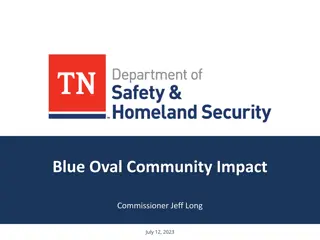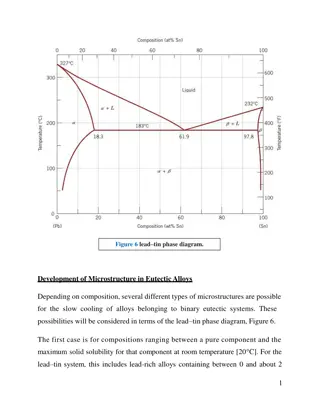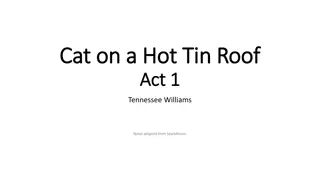Analysis of Act 2 in Cat on a Hot Tin Roof by Tennessee Williams
Act 2 of Cat on a Hot Tin Roof delves into the intense confrontation between Big Daddy and Brick, revealing hidden tensions, repressed desires, and complex family dynamics. The act unfolds with a raw portrayal of familial conflicts, secrets, and attempts at honesty amidst celebrations and revelations.
Download Presentation

Please find below an Image/Link to download the presentation.
The content on the website is provided AS IS for your information and personal use only. It may not be sold, licensed, or shared on other websites without obtaining consent from the author. Download presentation by click this link. If you encounter any issues during the download, it is possible that the publisher has removed the file from their server.
E N D
Presentation Transcript
Cat on a Hot Tin Roof Cat on a Hot Tin Roof Act 2 Act 2 Tennessee Williams Notes adapted from Sparknotes
Act 2 Act 2 Act II begins with the first meeting between Big Daddy and Brick of the play, a meeting quickly interrupted by Daddy's birthday festivities. Gooper, Mae, and Maggie's wrangling is thinly veiled at best; the grandchildren put on a burlesque of familial devotion; and Reverend Tooker tactlessly discusses death and memorial windows. Daddy's coarse outburst disrupts the party chatter, moving rapidly to the primary action of Act II, the encounter of father and son. Believing that he has returned from the dead, Daddy rejects all the hypocritical, pandering crap about him and proceeds to set his son straight. Belligerently, Daddy interrogates Brick on his sex life and his drinking. He asks him why he will not sleep with Maggie. As the interrogation progresses, the relationship between Brick's sexuality and his drinking will become clearer. In attempting to establish a certain intimacy with Brick, Daddy will call him to judgment and help him become his rightful heir. He will refuse Brick's attempts at flight, refuse to allow his repressions to keep things unspoken between them, and force Brick to recognize the desire he could not avow in his friendship with Skipper. What melodramatically impels this Act is the men's showdown over what remains inadmissible between them. The two men push progressively toward the inadmissible's revelation.
Act 2 Act 2 Note here the use of the clock. Its chime marks a shift in the scene's rhythm, moving into the father-son dialogue that composes the rest of the act. As Maggie notes in Act I, Daddy is an old-fashioned "Mississippi redneck" large, brash, and vulgar. His humor is decidedly grotesque, much to the amusement of Maggie. Maggie, as she muses in Act I, is genuinely fond of Daddy and the only other one present attuned to and amused by grotesquerie. The primary butt of Daddy's jokes is Big Mama, who bears the brunt of his rage when she attempts to calm him. As he tells Mama, his colon has become spastic out of disgust from the lies and hypocrisy that define their life together. When Mama helpless laments that he has never believed she loved him, he can only murmur bitterly: "Wouldn't it be funny if that was true " Mama appears deep in denial, constantly insisting that Big Daddy does not mean what he says. Note how she almost willfully misapprehends Daddy's disgust with mendacity. At first glance, it appears that Daddy's remark calls Mama's love into question. Daddy, however, does not doubt Mama's almost embarrassingly dogged devotion. His disgust is with his own mendacity, the life he has spent with a woman he cannot stand.
Act 2 Act 2 We should also mark Daddy's lecture carefully, a lecture Brick himself will come to repeat soon after. This lecture begins to elaborate the play's parallel loves, that of Brick and Maggie and Daddy and Mama. Put otherwise, Daddy is not only Brick's judge, but he is also his double. Daddy's narcissistic love for Brick is clear. As Williams notes, Brick bears the same charmingly masculine indifference Daddy must have in his youth. Brick is his would-be heir, his means of immortality. As Mama will note at the close of the play, Daddy wants above all that Brick provide him a grandson who is as much like his son as Brick is like himself. The mirror relationship between them will become clearer in the course of their dialogue progresses, in which Brick and Daddy will appear through various structures of rivalry.
Act 2 Act 2 During the conversation, Daddy comes close to the topic that remains repressed between them, and refuses to allow Brick his flight. Before reaching the secrets that rest between them, Daddy takes advantage of the pause opened by the clock chimes to pursue a rather strange detour through his travels with Big Mama. Of particular note are the anecdotes of the screaming children in Barcelona and child prostitute in Morocco. Daddy's memories of his travels introduce a motif familiar to Williams's readers: the Mediterranean/North Africa as a primal space, a space savagery, lawlessness, and sexual excess, all that which civilization would repress. The most notorious example of this fantasy probably comes from Suddenly Last Summer, in which a wealthy Southerner who takes gay sex trips to the region is devoured by a band of street children. These exotic locales and their inhabitants become ciphers for the desires that remain repressed at the home. For example, later, Brick tells of a fraternity pledge who flees to North Africa when the brothers discover that he is a sodomite. Two repressed ideas demanding revelation, what Williams calls "inadmissible things," structure this showdown between father and son. The inadmissible things are Daddy's imminent death and Brick's homosexual desire. The first is a point of dramatic irony throughout the scene, since Daddy believes he has returned from the grave. Though his coming death has been quickly repressed, as Freud notes, the unconscious can never know its own death, in some sense Daddy has confronted its possibility. As he tells Brick, what distinguishes man from beast is the terrifying apprehension of his own demise.
Act 2 Act 2 Daddy returns from death and dismisses the vanitas of his worldly possessions and understands that a rich man cannot buy his life. Instead he is bent on acting on his desire in all its violence. Not only will he buy a beautiful woman but smother her in minks, choke her with diamonds, but Daddy is murderous in his fetishism. Note the ironic intervention here of what Williams's terms the "perfectly timed" yet "incongruous" interruption: Mama's pitiable entrance at the very moment Daddy dreams of infidelity. As Daddy will tell Brick, there is little that shocks in "death's country." Daddy's sojourn in "death's country" perhaps recalls his reminiscence of his world travels and the child prostitute in particular. Daddy's encounter, "on the other side of the moon," with that civilization would be repressed at all costs. In returning from death's country, Daddy would force his son to face his own desire. Desperately Brick attempts to dodge him, emptying his words of all significance. As he tells Daddy, their talks never materialize and nothing is said. When Daddy presses him, Brick reveals why he yearns for "solid quiet," and why he would deny that their talks take place anywhere or refer to anything: it is because they are "painful." Turning from his desire, Brick has abandoned the world behind a screen of liquor. He is reduced to the daily, mechanical search for his click that gives him peace.
Act 2 Act 2 Ultimately Brick attempts to flee to keep his cool. Daddy makes him stay, wrenching his crutch from under his leg, forcing him to feel pain. As in Act I, the screeching child functions to instantiate the revelation of the repressed. Here Daddy assumes terrifying proportions and the film version of this scene is particular striking in this respect. Daddy would make Brick face the desire that compromises him in his impenetrability, the desire that unmans him. Brick's second crippling at Daddy's hands symbolizes his castration. As we will see, Daddy's move is not only a call to judgment but narcissistically motivated as well: he is crippling his rival.
Act 2 Act 2 With Brick at his feet, Daddy continues to demand the truth. Their bargain leads to Brick's own "recitative," his own account of what ensued between Maggie, Skipper, and himself. First, however, Brick attempts another dodge, a feint that Daddy must elucidate. He attributes his drinking to his disgust for the mendacity. Daddy has every reason to suspect his son of passing the buck as he uttered the same lines a few moments earlier in his lecture to Big Mama. Brick's declaration is an example of empty speech, speech that would put its listener off the track of his desire. As we will see, Daddy will appear to make sense of Brick's proclamation of disgust at the end of his tale but in a way that strangely seems to refer to his own state of affairs.
Act 2 Act 2 Brick crumbles once again upon the second revelation of homosexual desire in his friendship with Skipper. In erupting violently at Daddy, Brick "doth protest too much." His horror at the thought of being identified with the litany of epithets that he recites, his disgust at the gossipmongers about him, only points to a fear that they might be true. Brick's desire is either utterly unspeakable or only in epithets ("Fairies") that would ward off, but nevertheless reveal his guilt. The incongruous but perfectly timed interruption of Reverend Tooker marks the presence of a lie of conventional morality, a lie that Brick, the darling child of this conventional world, has repeated to lethal consequences. Thus, even in admitting his love for Skipper, Brick would still make it the stuff of legend: good, true, and completely asexual. Though he had sex with Maggie, they were than two cats humping on a fence, and he and Skipper shared a higher love. In Brick's fantasy, Maggie is to blame for Skipper's ruin, and the conniving Maggie is the scapegoat. She planted the idea of sodomy in poor Skipper's head. She led him to sleep with her. She caused his death. Note here the ambiguity in Brick's confession of jealousy at Skipper and Maggie pairing off, and that it remains unclear which of the two he covets.
Act 2 Act 2 Daddy, however, will not allow his son to pass the buck. As discussed above, he has returned from "death's country" and has no qualms confronting Brick with his homosexual desire. Indeed, Daddy almost suggests that he understands his son all too well since he "knocked around" himself in the old days. In this respect his spastic colon seems somewhat over determined. Brick is heir to a tradition to perverse fathers, a tradition that begins from Straw and Ochello onward, a tradition from which the women are excluded, desperately wanting men who would have nothing to do with them. Brick's disgust for his "family history" is clear. Incidentally, it is not for nothing that the conservative film version of Cat replaces Straw and Ochello with a fondly remembered grandfather. Already we have noted the narcissistic relation between Brick and Daddy. Williams underscores the strange face-off happening between them. As the stage notes indicate, in delivering his recitative, Brick has decided to match the revelation of his "inadmissible thing" with that of Daddy's. Finally we should also note that Williams warns us against drawing "pat" conclusions, namely, that Brick's problem is that he is a repressed homosexual. Here Williams does not "back off" from homosexuality. The play is quite explicit but cautions us from immediately fixing Brick as a closet case.
Act 2 Act 2 Here Daddy finally forces Brick's confession and receives his own "inadmissible thing" in return. This showdown reveals the nature of the love between them. Williams's precipitates Brick's revelation through a device introduced earlier, the off-stage telephone. Here the phone call is a call from the dead, evoking Skipper's final confession to his friend. As Brick confesses, he refused him. Thus Daddy delivers his final diagnosis, that Brick is disgusted with his own mendacity. He dug his friend's grave rather than face the truth, a truth that even now Brick would assign exclusively to Skipper.
Act 2 Act 2 While Daddy's diagnosis rings true, it also sounds suspiciously familiar. In some sense, it is almost one of those pat conclusions against which Williams warns in the stage notes. Though Daddy certainly plays judge here, he does not speak from an "objective" position, from the position according to which we can determine the "moral" of the play. His diagnosis is also implicated in the psychological drama unfolding before us. It does not speak from some place outside the play, commenting impartially on the action. Thus note how Daddy's diagnosis strangely repeats his own remark to himself in Act II, where he murmurs in disgust over the mendacity in his staying with Big Mama for forty years. Here he projects this disgust onto his son: "You!" he cries accusingly. Already we have noted the numerous manifestations of Daddy's narcissistic investment in his son. Their final exchange makes explicit the men's mirror relation and particular through the complementary interplay of the "you"s and "me"s they find themselves screaming throughout this scene.
Act 2 Act 2 Thus Brick matches the revelation of his repressed desire with that of Daddy's death. Here the telephone almost embodies and voices Daddy's inner protest: "no, no, you got it all wrong! Upside down! Are you crazy?" The screeching child interrupts anew, both marking the violent revelation of the repressed and symbolizing Daddy's death itself. Daddy bellows in rage, denouncing the "lying dying liars" that surround him. The bawling child serves as another ventriloquism of his anguish. Thus father and son figure as doubles in their roles as revealer and recipient of the other's inadmissible thing. Like Daddy's sojourn in "death's country," Brick's being "almost not alive" makes him "accidentally truthful." They present themselves as the only ones in the cast who have never lied to each other. Both stand on polar limits of the system of mendacity that is life. Note here how Brick's pronouncement on mendacity also echoes Daddy's, Brick being the drunkard and Daddy the dead man. In telling Daddy of his death, Brick has staged a reversal, turned things "upside down," and now Daddy stands in the place he just occupied. It is a violent act, robbing Daddy of his second life. As Brick almost gratuitously declares upon his second exit, emphasizing the duality of the exchange that has just ensued: "You told me! I told you!"
Act 2 Act 2 As the stage notes indicate, their contest, a contest over exacting the revelation of the other's secret as well as the other's affirmation of the repressed, is symbolized by their struggle over Brick's phallic crutch. The crutch is a "weapon for which they were fighting for possession." No longer Brick's support, it appears as the means by which the men would do injury to each other. Brick and Daddy's final struggle thus marks the reverse side of the narcissistic love between them, the aggressive logic of "either you go or I go" between those who mirror each other too closely. Note in this respect Daddy's desperate response of Brick's revelation. Brick will certainly outlive him and he will have to pay for his coffin.























